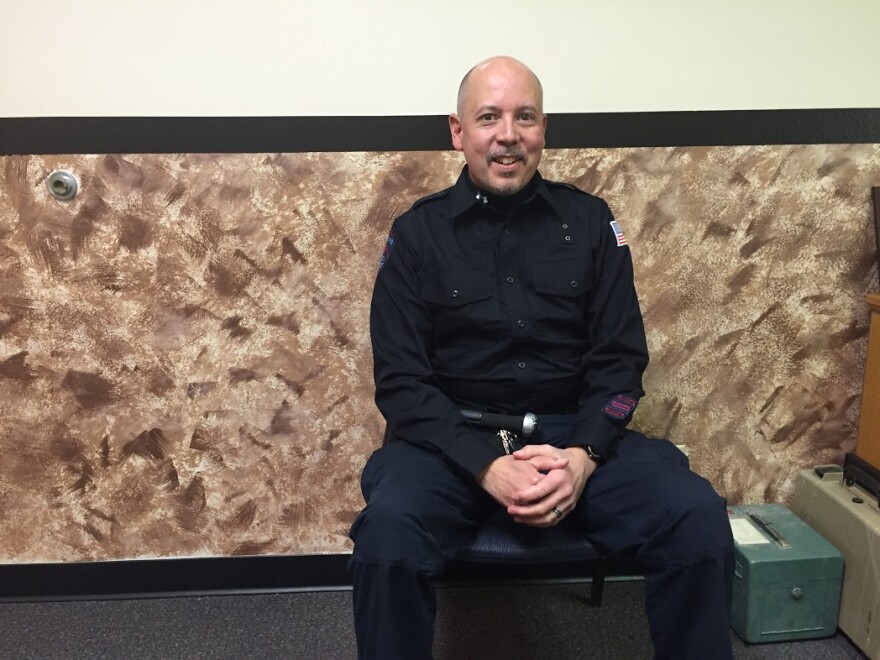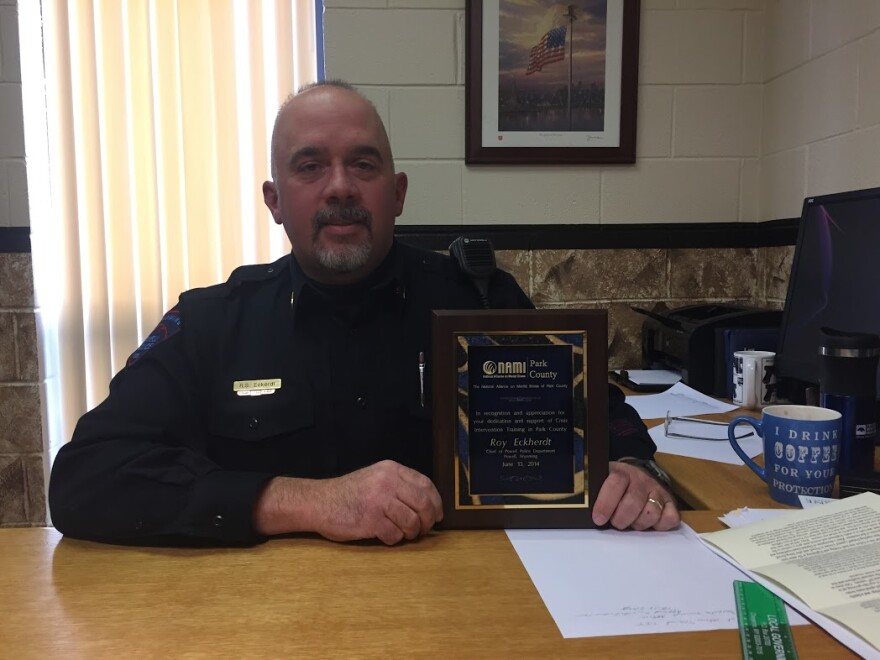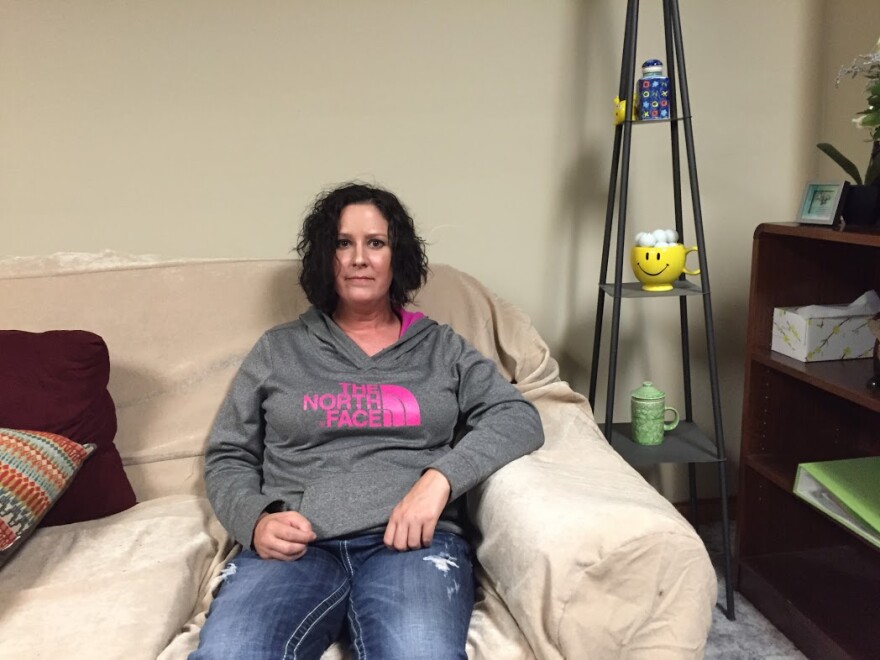A few weeks after Cody officer Seth Horn went through Crisis Intervention Training, or “CIT,” he went out on a call to see a man who was potentially suicidal.
“I started speaking with this person, and some things were lining up with the report that we got,” Horn said in a department conference room. “And then, using the training, I started to ask some very specific questions.”
Horn wasn’t fresh on the force--he had encountered people in a mental health crisis many times before. Before CIT, Horn might ask those people something along the lines of, “Are you planning on hurting yourself?”
But during CIT’s forty hours of intensive training with other cops and local mental health workers on how to deal with people who have mental health issues, Horn learned that “Are you planning on hurting yourself?” is a vague question that can yield misleading answers. Some suicide methods might not be thought of as physically painful by the person in crisis. So Horn went with something more difficult, but more direct.
“Are you thinking about killing yourself?”
The man said yes.
“Those kinds of questions are uncomfortable to ask until you start doing it regularly,” Horn said. And then it flows into the conversation. So it's little things like that with the training that I think make a difference.”
Across the country, the first professional responder someone in a mental health crisis sees is often law enforcement. That’s especially the case in Wyoming, where the suicide rate is double the national average and lacks the mental health resources of more urban areas. CIT has been used since the late 1980s by law enforcement agencies across the country to improve officers’ interactions with people in a mental health crisis. The program was introduced in Wyoming a decade ago, but it's been slow to spread, especially to more rural communities.
Park County was treading new ground when it started Crisis Intervention Training back in 2009. Since then, the way the training was implemented in Cody and Powell has become a model for other small communities. But it’s been a long road to get there. And it didn’t start with the cops.
TerresaHumphries-Wadsworth is the Director of Statewide Suicide Prevention for the Prevention Management Organization of Wyoming. Back in 2009, she was working at a mental health center in Cody. At the time, the status of mental health services in the area was bleak.
“In 2009, we didn’t even have a psychiatrist,” Humphries-Wadsworth said.

She said that Park County, like other rural counties in the state, lacks mental health professionals and psychiatric hospital beds. That means when cops can’t calm someone in a mental health crisis down, that individual may end up in jail. And Humphries-Wadsworth said the mental health professionals that were there weren’t communicating well with law enforcement. In Park County in 2012, between fifty and eighty people were treated for serious mental health issues against their will; that year there were only around two hundred such cases in the entire state.
“Really, it was a huge problem,” she said. “We said OK, let's fix it locally, what’s the best thing we can offer with what we have?”
Humphries-Wadsworth and others in the local mental health community settled on Crisis Intervention Training. But right away they ran into some problems. Training in cities like Cheyenne and Casper ran forty hours over the course of five days—Cody and Powell’s much smaller police departments couldn’t leave the streets empty to do that. And in Park County, almost everyone was going to have to get the training for it to be effective.
“In big cities they have special teams that go out and do [interventions with people in a mental health crisis],” Humphries-Wadsworth said. In small cities, they only have a couple officers onyou are the team!”—you are the team!”
So Cody and Powell broke the training into two—a three-day session and a two-day session, held a few months apart. And they incentivized it by giving “continuing education credits,” which law enforcement officers are required to earn.
The last big barrier was convincing the cops that CIT was worth their time. Initially, many were skeptical of the notion that mental health workers knew how to police better than they did. Powell Police Chief Roy Eckerdt said that the buy-in largely stemmed from the fact that local cops were just frustrated—the same old strategies weren’t working.

“We would deal with the frustration, as officers, of going to the same house time and time and time again,” Eckerdt said, “because people weren’t getting the resources that they need.”
The Powell Police Department doesn’t have hard numbers on how CIT has affected their policing. But Chief Eckerdt said, since CIT, the number of cases labeled as related to mental health crises has gone up by about fifty percent, even though the total number of calls has stayed the same. According to Eckerdt, that means more cases are being recognized as related to mental health, and not shuffled into other designations like public nuisance.
TerresaHumphries-Wadsworth says she would like CIT to spread faster, but organizers can’t pick up the pace alone.
“We are community driven,” she said. “So the decisions about what happens in community, happens in the community. Wyoming doesn’t like being told what to do.”
State organizers don’t have the authority to mandate CIT for individual enforcement agencies. Humphries-Wadsworth said, so far, the training has spread in a piecemeal fashion: a police department will send one officer to a training happening somewhere else; he or she goes back afterward and makes the case to their coworkers that it's worth doing, and, eventually, that department starts planning its own training. Humphries-Wadsworth said Douglas and Riverton are interested in starting CIT using Park County’s idea of breaking the training into two sessions while Gillette just had its first session. But the process can take years from start to finish.

Ashley Overfield is thankful that her local cops in Cody have gone through Crisis Intervention Training.
“I’ve lost track of how many times I’ve been arrested,” she said sitting in the basement of a Cody group home “Probably 17, at least.”
Overfield is 35, and her diagnosis of bipolar and schizoaffective disorder has contributed to frequent run-ins with the Cody police over the years, as well as an attempted suicide. Overfield has ended up in jail many times, and she says in the past officers could be aggressive, which make her crises worse. But Overfield says there has been a real change in the last few years. Recently Overfield’s mom called the police to do a welfare check on her.
“Three officers showed up at the house. They were all very calm, nice respectful. And it made things a lot smoother. I was more willing to just go with the flow.”









